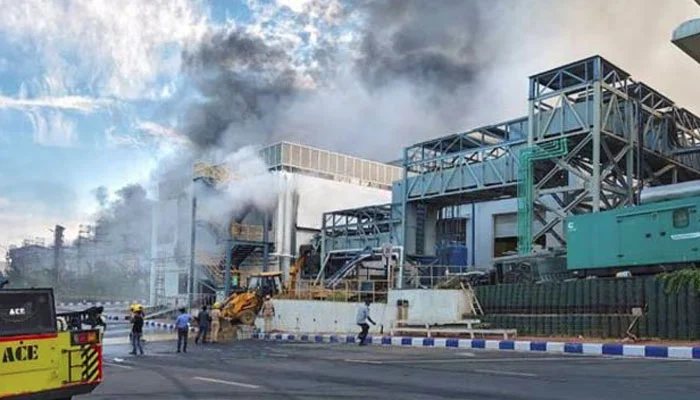A significant fire recently broke out at Tata Group’s iPhone component plant in southern India, causing extensive damage. This incident has raised concerns about Apple’s ability to produce enough iPhones in time for the upcoming festive sales season. The fire might force Apple’s suppliers to find essential parts from China or other places, which could complicate their production plans.
Production Halt at Hosur Plant
The fire happened over the weekend and has led to an indefinite halt in production at Tata’s Hosur facility, located in Tamil Nadu. This plant is crucial as it is the only supplier in India that makes back panels and some other components for the iPhone. These parts are essential not only for Tata’s own iPhone assembly but also for Foxconn, another major manufacturer that partners with Apple in India.
The interruption in production is particularly troubling because the festive season in India, which usually sees a surge in smartphone sales, is approaching. With Diwali and other celebrations around the corner, many consumers look to buy new devices, and Apple aims to meet this demand.
Impact on Festive Season Sales
According to Counterpoint Research, a firm that tracks technology trends, local sales of the iPhone 14 and iPhone 15 models are expected to reach about 1.5 million units during the festive season, which runs from late October to early November. However, due to the fire at Tata’s plant, Apple might struggle to fulfill as much as 15% of this demand. This means that many consumers might not be able to get the iPhones they want during this peak shopping time.
Neil Shah, who co-founded Counterpoint, mentioned that the fire could lead to a 10-15% decrease in production of older iPhone models in India. While Apple might be able to lessen the impact by importing more parts or shifting existing inventory to India, the situation remains challenging.
Production Outlook

To manage the fallout from the fire, Apple may need to adjust its strategies. One possible solution could involve importing more components from other countries to make up for the shortfall. Additionally, the company might reroute some of its export inventory towards the Indian market to help meet local demand.
Tata is not just supplying the Indian market; it also exports iPhones and components to other countries, including the Netherlands and the United States. Reports indicate that these exports are worth more than $250 million overall, making Tata an important player in Apple’s global supply chain.
Supply Chain Challenges
Apple’s suppliers usually keep a stock of back panels that can last for about three to four weeks. However, some sources suggest that Tata may have enough inventory to last up to eight weeks. This stock might help Apple avoid immediate problems. Yet, if the production halt continues for a longer period, the company could find itself in a difficult position.
In such a scenario, Apple might consider setting up another assembly line in China or adding more shifts at existing facilities there to ensure that they have enough parts for the Indian market. This situation highlights how interconnected the global supply chain is and how disruptions in one area can have ripple effects across the world.
Broader Implications for “Make in India”
The fire at Tata’s plant also raises questions about India’s efforts to attract foreign investment through its “Make in India” initiative. This program aims to boost local manufacturing and reduce reliance on imports. However, disruptions like this fire cast a shadow over these ambitions, especially in the electronics sector.
Apple has been working to diversify its supply chain away from China, but challenges remain. Last year, separate fires at suppliers Foxlink and Pegatron in India caused brief operational halts, exposing vulnerabilities in safety and management practices. Additionally, companies like Wistron and Foxconn have faced labor issues that have affected their operations.
Future Prospects
Despite these challenges, experts believe that India still has the potential to become a major hub for electronics manufacturing. Prabhu Ram, a vice president at Cybermedia Research, pointed out that these setbacks are temporary. He stressed the importance of improving safety and operational standards to strengthen India’s position as an emerging global electronics manufacturing center.
Tata Group is one of Apple’s newer suppliers in India. Analysts estimate that Tata will contribute about 20-25% of total global iPhone shipments this year, a significant increase from the 12-14% share it had last year. This growth reflects Apple’s commitment to expanding its manufacturing base in India.
Employment and Production Developments
The fire-affected plant employed around 20,000 workers, making its closure a significant event for the local economy. Moreover, another unit within the same Tata complex was expected to start producing complete iPhones later this year. It remains uncertain whether this incident will delay those plans.
Tata also operates another iPhone assembly plant near Bengaluru, which it acquired from Wistron last year. Additionally, the company is set to acquire a second facility in Tamil Nadu from Pegatron. These developments indicate that Tata is serious about expanding its role in Apple’s supply chain and increasing its manufacturing capabilities in India.
The recent fire at Tata’s plant is a critical event that could have wide-reaching implications for Apple and the Indian smartphone market. As the company prepares for the festive season, it faces challenges in production and supply chain management. However, with strategic adjustments and improvements in safety standards, there is still potential for growth in India’s electronics manufacturing sector. The situation serves as a reminder of the complexities and vulnerabilities within global supply chains, especially in the fast-paced tech industry.





